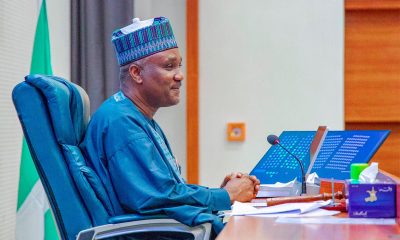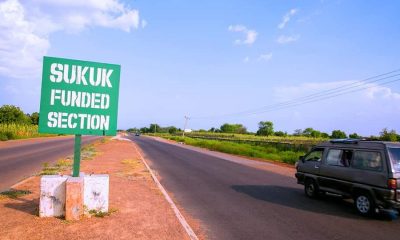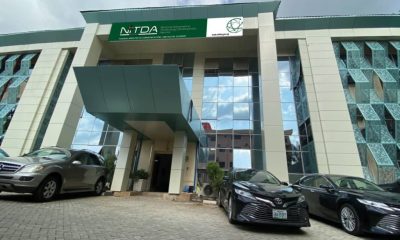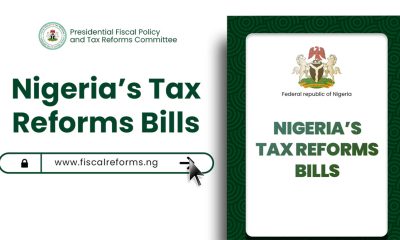Business
Subscribers kick as FG slams N90.49bn new tax on phone calls

…telcos meet govt this week over new tax, others
Telecommunication subscribers are kicking against a new Federal Government directive to impose a tax on telephone calls in the nation to fund free healthcare for the vulnerable.
The telecom tax in the equivalent of a minimum of one kobo per second for phone calls is a part of the sources of funds required to finance free healthcare for the Vulnerable Group in Nigeria, according to the National Health Insurance Authority Bill 2021 signed by the President, Major General Muhammadu Buhari (retd.), last week.
According to the Nigerian Communications Commission, Nigerians made 150.83 billion minutes of calls in 2020. This translates to 9.05 trillion seconds of calls, meaning the new tax will generate 9.05 trillion kobo, which converts to N90.49bn, yearly.
This new tax is coming despite moves by telecom companies to increase the price of calls, SMS, and data by 40 per cent as a result of an unfavourable operating environment.
According to the Health Insurance Act, the Vulnerable Group Fund is money budgeted to pay for healthcare services for vulnerable Nigerians who cannot pay for health insurance in a bid to subsidise the cost of provision of health care services to vulnerable people in the country.
It added that the Vulnerable Group Fund will subsidise the provision of healthcare to children under five, pregnant women, the aged, physically and mentally challenged, and the indigent as may be defined from time to time.
The Act includes a provision under Section 26 subsection 1c which states that one of the sources of money for the Vulnerable Group Fund shall include a telecommunications tax, not less than one kobo per second of GSM calls.
Other sources of funding outlined in the Act includes a basic healthcare provision fund to the authority; health insurance levy; telecommunications tax, not less than one kobo per second of GSM calls; money that may be allocated to the Vulnerable Group Fund by the government; motley that accrues to the Vulnerable Group Fund from investments made by the Council: and grants, donations, gifts, and any other voluntary contributions made to the Vulnerable Group Fund.
According to the new Act, every resident in Nigeria is expected to obtain health insurance.
However, telecom subscribers under the aegis of National Association of Telecoms Subscribers, have said they will reject this new move by the government.
The President of the association, Adeolu Ogunbanjo, said, “It is quite unfortunate that the government is viewing telecoms as a cash cow. We are saying. There is a lot of corruption in the system, and rather than curb that they want to focus on the telecoms sector.
“What do they mean by vulnerable? Vulnerable people in the nation are probably about 80 per cent of the population, we are all vulnerable. What has happened to the health budget? Why should it touch telecoms again? The government should look elsewhere for money. This new action is only likely to impoverish more Nigerians and they are masquerading as helping the vulnerable. This is not right.”
Recently, telecom companies wrote to the Federal Government, through the Nigerian Communications Commission, on the worsening conditions of the industry.
According to a source at the Association of Licensed Telecommunication Operators of Nigeria, telecom companies cannot reject a directive of the government. The source said subscribers would pay more for calls once the tax is implemented.
He added that the NCC and ALTON would meet this week in order to discuss the issues disturbing the industry.
He said, “We are aware of the tax. We had been told before. It is the subscribers that would have to pay for this. This means subscribers will pay more for this service. Telcos cannot say no to this. It is a government directive; we can’t resist the government. I can’t say more about it.
“We are having a leadership summit with the NCC this week and we would discuss some of these issues with the NCC. Presently, telcos are paying more than 36 taxes. This is a law; we cannot reverse it. The president has signed it and before it can be changed, it must go back to the National Assembly.
“Also, we cannot give an implementation date, the government is to tell us that.”
Commenting on the act on his LinkedIn page, the Fiscal Policy Partner, and Africa Tax Leader at PricewaterhouseCoopers, Taiwo Oyedele, said this new law would translate to a nine per cent tax on GSM calls.
Punch
Railway
Lagos Rail Mass Transit part of FG free train ride – NRC

Lagos Rail Mass Transit part of FG free train ride – NRC
The Nigerian Railway Corporation (NRC) has disclosed that the Lagos Rail Mass Transit (LRMT) trains are included in the Federal Government’s free train ride initiative for the Christmas and New Year celebrations.
The LRMT, which currently includes the Phase 1 Blue Line Rail and the Phase 1 of the Red Line Rail, operates under the Lagos Metropolitan Area Transport Authority (LAMATA).
This announcement was made by Ben Iloanusi, the Acting Managing Director of the NRC, during an interview on NTA News TV on Friday, following the launch of the initiative earlier that day.
While Iloanusi stated that Phase 1 of both the Blue Line and Red Line Rail projects are part of the program, LAMATA has yet to confirm this inclusion.
READ ALSO:
- Nigeria denies alleged plot to destabilise Niger Republic
- Navy arrests 19 Nigerians attempting to reach Europe by hiding on ship
- Troops arrest four Ambazonian rebels in Taraba
Iloanusi outlined the other routes benefiting from the scheme, which include the Lagos-Ibadan Train Service, Kaduna-Abuja Train Service, Warri-Itakpe Train Service, Port Harcourt-Aba Train Service, and the Bola Ahmed Tinubu Mass Transit in Lagos. Notably, little was previously known about the Bola Ahmed Tinubu Mass Transit service until this disclosure.
“Let me mention the routes where this free train service is happening. We have the Lagos-Ibadan Train Service, we have the Kaduna-Abuja Train Service, we have the Warri-Itakpe Train Service, we have the Lagos Rail Mass Transit trains, we have the Port Harcourt-Aba Train Service, and we have what we call the Bola Ahmed Tinubu Mass Transit, which is also in Lagos,” he stated.
Iloanusi provided operational updates, stating that passengers nationwide can access free tickets online or, for those unable to do so, at train stations where they will be profiled and validated.
He noted that passengers using NRC-managed services (excluding the Lagos Rail Mass Transit) should reserve tickets via the official website, www.nrc.gov.ng, with a valid ID required. He also advised travelers to plan, arrive on time, and bring valid identification.
Lagos Rail Mass Transit part of FG free train ride – NRC
Business
NNPC denies claim of Port Harcourt refinery shutdown

NNPC denies claim of Port Harcourt refinery shutdown
The Nigerian National Petroleum Company Limited (NNPCL) has denied claims in media reports that the newly refurbished Port Harcourt refinery has shut down.
The national oil company denied the claim in a press release issued by its Chief Corporate Communications Officer, Olufemi Soneye, on Saturday.
Soneye said the claim was false and urged Nigerians to disregard it. He stressed that the Port-Harcourt Refinery is fully operational.
READ ALSO:
- Like Ibadan, stampede claim 10 lives for Abuja Catholic church, 17 in Anambra
- Marketers react after NNPCL slashes petrol price to N899 per litre
- Electricity: We installed 184,507 meters, issued 50 licences in Q3, says FG
The statement read, “The attention of the Nigerian National Petroleum Company Limited (NNPC Ltd.) has been drawn to reports in a section of the media alleging that the Old Port Harcourt Refinery which was re-streamed two months ago has been shut down.
“We wish to clarify that such reports are totally false as the refinery is fully operational as verified a few days ago by former Group Managing Directors of NNPC.”
He noted that preparation for the day’s loading operation is currently ongoing, and added that claims of the shutdown are “figments of the imagination of those who want to create artificial scarcity and rip-off Nigerians.”
NNPC denies claim of Port Harcourt refinery shutdown
Business
CBN permits BDCs to buy up to $25,000 FX weekly from NFEM

CBN permits BDCs to buy up to $25,000 FX weekly from NFEM
The Central Bank of Nigeria (CBN) has granted Bureau de Change (BDC) operators temporary permission to purchase up to $25,000 weekly in foreign exchange (FX) from the Nigerian Foreign Exchange Market (NFEM).
The Central Bank of Nigeria (CBN) has granted Bureau de Change (BDC) operators temporary permission to purchase up to $25,000 weekly in foreign exchange (FX) from the Nigerian Foreign Exchange Market (NFEM).
This move, detailed in a circular dated December 19, 2024, is designed to meet seasonal retail demand for FX during the holiday period.
The circular was signed by T.G. Allu, on behalf of the Acting Director of the Trade and Exchange Department.
The arrangement will be in effect from December 19, 2024, to January 30, 2025.
Under the directive, BDCs may purchase FX from a single Authorized Dealer of their choice, provided they fully fund their accounts before accessing the market.
Transactions to occur at the prevailing NFEM rate
The transactions will occur at the prevailing NFEM rate, and BDCs are required to adhere to a maximum 1% spread when pricing FX for retail end-users.
READ ALSO:
- Badenoch’s negative portrayal of Nigeria Police unfair-PCRC
- Bitcoin price crashes to $95,000 as market continues to react to Federal rate cuts
- Bauchi high court dismisses blasphemy, cybercrime charges against Rhoda Jatau
All transactions conducted under this scheme must be reported to the CBN’s Trade and Exchange Department.
The circular read in part:
“In order to meet expected seasonal demand for foreign exchange, the CBN is allowing a temporary access for all existing BDCs to the NFEM for the purchase of FX from Authorised Dealers, subject to a weekly cap of USD 25,000.00 (Twenty-five thousand dollars only).
This window will be open between December 19, 2024 to January 30, 2025.
“BDC operators can purchase FX under this arrangement from only one Authorized Dealer of their choice and will be required to fully fund their account before accessing the market at the prevailing NFEM rate. All transactions with BDCs should be reported to the Trade and Exchange department, and a maximum spread of 1% is allowed on the pricing offered by BDCs to retail end-users.”
The CBN assured the general public that PTA (Personal Travel Allowance) and BTA (Business Travel Allowance) remain available through banks for legitimate travel and business needs.”
These transactions are to be conducted at “market-determined exchange rates” within the NFEM framework.
This initiative reflects the CBN’s strategy to stabilize the FX market and manage seasonal surges in demand.
CBN permits BDCs to buy up to $25,000 FX weekly from NFEM
-

 Railway1 day ago
Railway1 day agoLagos Rail Mass Transit part of FG free train ride – NRC
-

 metro2 days ago
metro2 days agoCourt stops customs from seizing imported rice in open market
-

 metro7 hours ago
metro7 hours agoWhy we displayed ‘Jesus Christ is not God’ banner at Lekki mosque -Imam
-

 metro2 days ago
metro2 days agoIbadan stampede: Tinubu orders probe as death toll hits 40
-

 metro1 day ago
metro1 day agoIbadan stampede: Ooni reacts after arrest of ex-wife
-

 metro2 days ago
metro2 days agoAfe Babalola: Court grants Dele Farotimi bail, barred from media interviews
-

 metro1 day ago
metro1 day agoNIMC warns against extortion, reaffirms free NIN enrollment
-

 News2 days ago
News2 days agoAdebayo Ogunlesi, 2 other Nigerians make Forbes 50 wealthiest Black Americans list 2024













